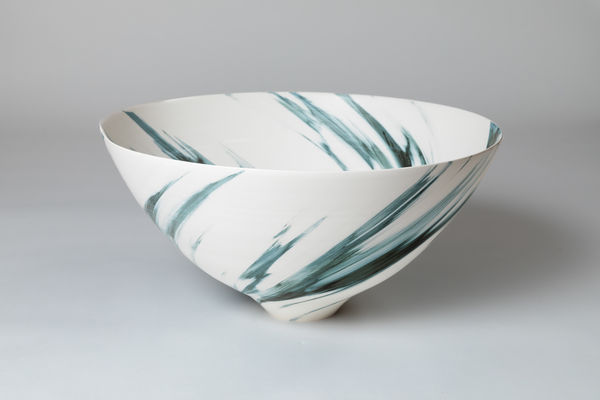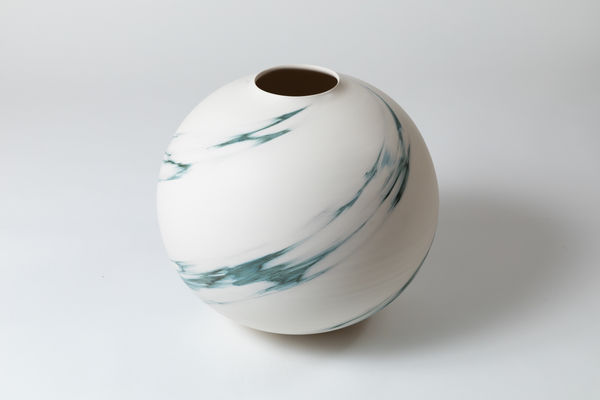-
 The main apprentice of the living national treasure in bizen, Jun Isezaki, Hiroshi Goseki (b. 1988) is on the frontier of innovation in the traditional and well-established bizen style. Goseki outsources no aspect of his creative process; the import of bizen clay to his studio in Ibaraki prefecture, lumber foraging, a combination of wheel-thrown and hand-built techniques, and constant refueling of a the fourteen-day kiln fire required of bizen class ceramics are all elements that contribute to the artist’s unique pieces.
The main apprentice of the living national treasure in bizen, Jun Isezaki, Hiroshi Goseki (b. 1988) is on the frontier of innovation in the traditional and well-established bizen style. Goseki outsources no aspect of his creative process; the import of bizen clay to his studio in Ibaraki prefecture, lumber foraging, a combination of wheel-thrown and hand-built techniques, and constant refueling of a the fourteen-day kiln fire required of bizen class ceramics are all elements that contribute to the artist’s unique pieces. -
 Tomoyuki Hoshino (b. 1976) left his career to study ceramics under renowned ceramicist Ikai Yuichi, but though he became an artist in 2005, Hoshino carries his passion for people forward in his idea that the pink motif is a universal color inherent to humans. The color is not restricted by geography, sex, religion, or language. In 2013 he became a full member of the Japan Crafts Association, and his ceramics have since been exhibited extensively in Japan and Europe in both galleries and museums. In recognition of Hoshino’s unique approach, the artist has won many awards at Japan’s annual national and international exhibitions.
Tomoyuki Hoshino (b. 1976) left his career to study ceramics under renowned ceramicist Ikai Yuichi, but though he became an artist in 2005, Hoshino carries his passion for people forward in his idea that the pink motif is a universal color inherent to humans. The color is not restricted by geography, sex, religion, or language. In 2013 he became a full member of the Japan Crafts Association, and his ceramics have since been exhibited extensively in Japan and Europe in both galleries and museums. In recognition of Hoshino’s unique approach, the artist has won many awards at Japan’s annual national and international exhibitions. -
 Specializing in Arita-ware, Manji Inoue (b. 1929) crafts innovative porcelain works, encompassing the dichotomy of both fragility and strength. The visually delicate yet physically strong pieces place an importance on form over content, achieving a certain simplicity. Inoue’s mastery of this form has led him to be designated as a Living National Treasure for Arita-ware since 1995, recognized by the Japanese government for his great work and diligence in Arita craft. Now a nonagenarian, Inoue continues to work with the same amount of passion, and continues to exhibit his work in international solo exhibitions. Inoue trains students as well, passing on the Arita tradition to hundreds of disciples.
Specializing in Arita-ware, Manji Inoue (b. 1929) crafts innovative porcelain works, encompassing the dichotomy of both fragility and strength. The visually delicate yet physically strong pieces place an importance on form over content, achieving a certain simplicity. Inoue’s mastery of this form has led him to be designated as a Living National Treasure for Arita-ware since 1995, recognized by the Japanese government for his great work and diligence in Arita craft. Now a nonagenarian, Inoue continues to work with the same amount of passion, and continues to exhibit his work in international solo exhibitions. Inoue trains students as well, passing on the Arita tradition to hundreds of disciples. -
 The oeuvre of ceramicist Hiromi Itabashi (b. 1948) could easily be mistaken for soft sculpture, as his whimsical shapes contain an elegance seeming free of any rigidity. A modernist approach to traditional materials, Itabashi works mainly with white porcelain and chamotte. The use of these contrasting materialities allows for freer interplay of shapes and form. Itabashi complicates established notions of directionality, pushing the boundaries of how we look at an artwork.
The oeuvre of ceramicist Hiromi Itabashi (b. 1948) could easily be mistaken for soft sculpture, as his whimsical shapes contain an elegance seeming free of any rigidity. A modernist approach to traditional materials, Itabashi works mainly with white porcelain and chamotte. The use of these contrasting materialities allows for freer interplay of shapes and form. Itabashi complicates established notions of directionality, pushing the boundaries of how we look at an artwork. -

The ceramic works of Kan Kishino (b. 1975) exist within a similar earthen atmosphere. Kishino studied under famous ceramicist Dogyu Fukmori, with whom he perfected his aesthetic. Working in the heart of Shigaraki—one of the ancient kiln regions of Japan—his pieces are filled with influences from classic Yakishime and Ido styles. Kishino’s ceramics emphasize the spontaneity of a natural firing, incorperating traditional technique into contemporary ceramics.
-

Ryoji Koie (1938-2020) might be considered one of Japan's most forward-thinking artists of his time. Born in 1938 in Tokoname, Koie studied ceramics from a young age. Still, his bright spirit and curiosity made him a bold and experimental artist while staying true to traditional Japanese ceramic forms. His gestural application of glazes on the surface and the giant x creates a dynamic and innovative approach inspired by postwar contemporary art by artists such as Jackson Pollock. Koie won multiple awards throughout his career, including the Japan Ceramic Society Award in 1992, the Chunichi Cultural Award in 2005, and the Gold Prize for the Japan Society Award in 2008. His works can be found in permanent collections worldwide, such as the Smithsonian Museum, Victoria & Albert Museum, Centre National de Georges Pompidou, the Metropolitan Museum of Art, and the Seoul Metropolitan Museum of Art.
-

Leading ceramicist Masahiro Maeda (b. 1948) is known for glaze-painted porcelains pioneering distinctly contemporary designs. Maeda's approach to iro-e technique innovate traditional Japanese forms and color arrangements. His method of creating woven texture using paint masks produces timeless layered and overlapping surfaces. Maeda's works exhibited at the Victoria & Albert, Smithsonian National Museum, and Tokyo National Museum among many others, and are in collections of the highest caliber including the Philadelphia Museum of Art, Art Institute of Chicago, and many more. Maeda's work has led him to serve as a judge at Japan's top ceramic competitions, and his contributions to contemporary ceramic design influence generations of Japanese artists as director of Japan Crafts Association in addition to many other leadership roles at key craft institutions.
-

Mitsukuni Misaki (b. 1951) has an urge to create powerful, lifelike works, encapsulating the dual strength and subtlety of beauty in nature. His works have an unnameable sensation, with asymmetrical works conveying the desire for serenity. The works are referred to as Saiyuudeiki, noted by the Japan Ceramic Society Director Koichi Mori for a well-balanced, ample form. Saiyuudeiki loosely translates to ‘colored stoneware vessels,’’ with Sai 彩 as color, Yuu 釉 as glaze, Dei 泥 as clay and Ki 器 as vessel. The style stands in marked contrast to Bian-hu, a sleeker, flatter part of his cannon.
-
-
 Wataru Myoshu (b. 1990) is a contemporary ceramic artist raised in Kameoka, known for artisanal heritage. The proximity to the rich traditions in clay shaped Myosyu's upbringing; his influences are drawn from antique paster and Ryukyu Island pottery. Leaving the clay unglazed, his work has a natural porousness that creates subtle change over time.
Wataru Myoshu (b. 1990) is a contemporary ceramic artist raised in Kameoka, known for artisanal heritage. The proximity to the rich traditions in clay shaped Myosyu's upbringing; his influences are drawn from antique paster and Ryukyu Island pottery. Leaving the clay unglazed, his work has a natural porousness that creates subtle change over time. -
-

Andoche Praudel (b. 1950) is a French ceramicist and painter whose works incorporate philosophical concepts from both Western and Japanese traditions, transforming clay or the painted canvas into abstract expressions. Praudel recognizes the profound connection between clay and humans that is the foundation of life. His views, realized in the fire of the kiln and abstract brushstrokes, developed from a fond friendship with the infamous Japanese potter Raku Kichizaemon XV.
-
 Shion Tabata (b. 1947) is a virtuoso ceramicist with a deep connection to the antiques of the Edo period. As an antiques dealer at Osaka’s Tanimatsuya Toda Shoten in 1985, Tabata encountered leading works of the period, including the Rinpa style of Ōgata Korin and Ōgata Kenzan, which continues to influence her creative practice. Tabata draws on her deep knowledge of Japanese antiques to revive a variety of classical styles that previously were noticeably missing from the world of contemporary Japanese art.
Shion Tabata (b. 1947) is a virtuoso ceramicist with a deep connection to the antiques of the Edo period. As an antiques dealer at Osaka’s Tanimatsuya Toda Shoten in 1985, Tabata encountered leading works of the period, including the Rinpa style of Ōgata Korin and Ōgata Kenzan, which continues to influence her creative practice. Tabata draws on her deep knowledge of Japanese antiques to revive a variety of classical styles that previously were noticeably missing from the world of contemporary Japanese art. -
 Kai Tsujimura (b. 1976) is a leading light of the generation of Japanese potters just now coming into their own. Thoroughly trained by his father, famous pottery Shiro Tsujimura, Kai embarked on his career in 2001 when he built his own kiln in the hills of Nara. Since coming into his own, Tsujimura continues exhibiting his ceramics artworks extensively in Japan and the United States. In 2010, Tsujimura’s large jar joined the Minneapolis Institute of Art’s permanent collection.
Kai Tsujimura (b. 1976) is a leading light of the generation of Japanese potters just now coming into their own. Thoroughly trained by his father, famous pottery Shiro Tsujimura, Kai embarked on his career in 2001 when he built his own kiln in the hills of Nara. Since coming into his own, Tsujimura continues exhibiting his ceramics artworks extensively in Japan and the United States. In 2010, Tsujimura’s large jar joined the Minneapolis Institute of Art’s permanent collection. -

The ceramic works of Kodai Ujiie (b. 1990) are refreshingly avant-garde. Since his debut exhibition in 2014, Ujiie’s colorful and abstract wares have interpolated the kintsugi lacquer mending technique and experimented with unusual celadon colors. Ujiie now works from his kiln in Tajimi, Gifu Prefecture.




































